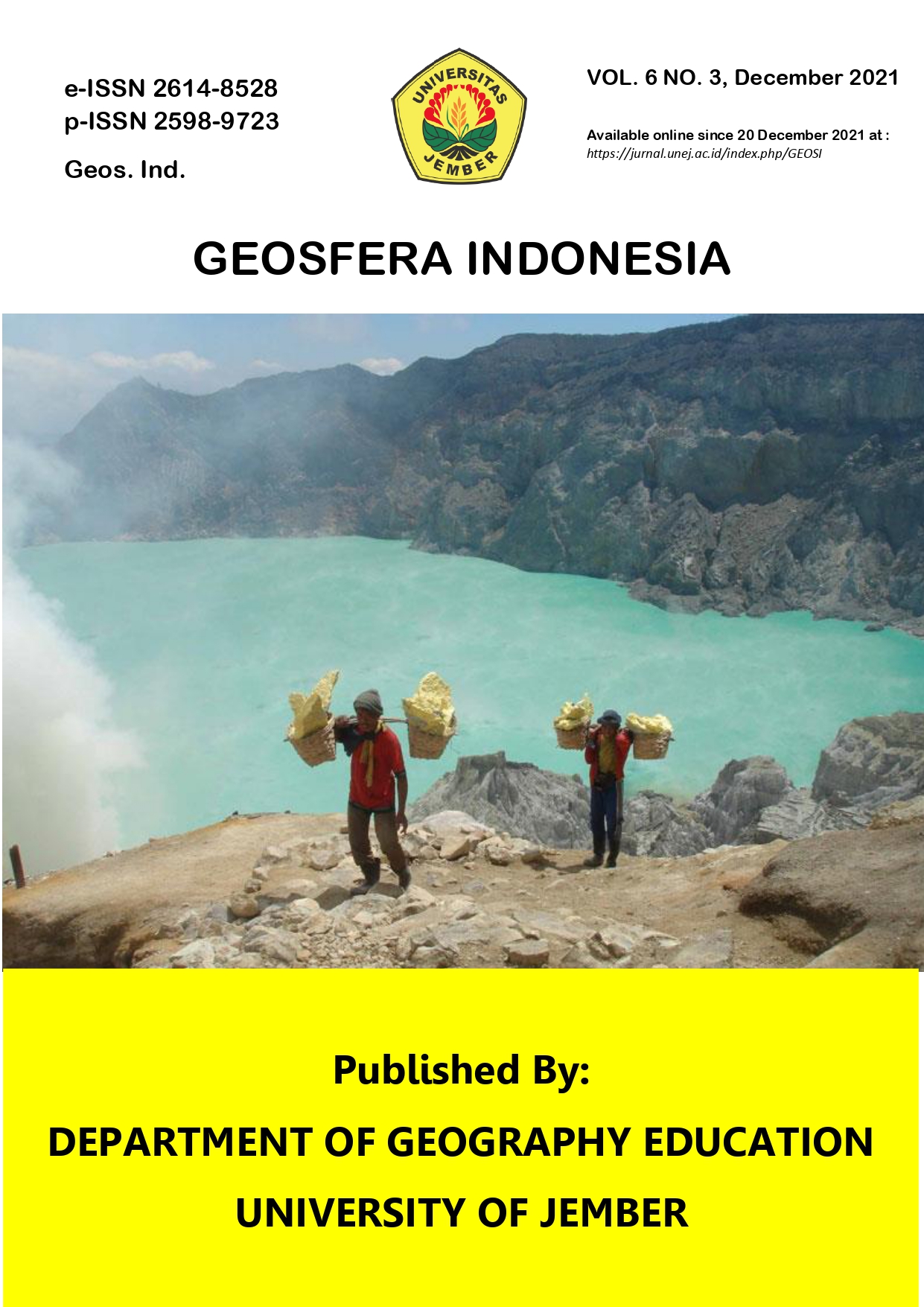Assessing the Effectiveness of Geography-based Online Learning During the Covid-19 Pandemic in Higher Education
DOI:
https://doi.org/10.19184/geosi.v6i3.25811Keywords:
Assessing, Effectiveness, Geography-based online learning, Covid-19, Higher educationAbstract
The Covid-19 pandemic almost stalled the face-to-face learning method in all institutions across the globe. Consequently, for learning to continue uninterrupted, there was a need to change teaching mode to online using social media and other platforms. This research aimed to examine the effectiveness of online learning during the Covid-19 pandemic and the challenges geography students faced in implementing this type of study. The research used a descriptive qualitative approach involving questionnaires designed to determine the implementation of online learning and the challenges encountered. The questions were structured through synthesizing various components of learning. Random selection was used to select 305 participants from various higher education institutions in the Aceh Region, Indonesia. The results indicated that online learning during the Covid-19 pandemic was effectively implemented. However, some challenges were encountered, including students who could not fully participate since they could not log in to the provided learning platforms. Furthermore, students from rural areas had poor internet connectivity besides the inability to buy internet quota. There were many instances of reported power supply failures, and this hindered online learning. Overall, learning geography during the pandemic was effective, though it had a fair share of challenges. The research also identified the need to develop an online learning model, teaching material, and multimedia in supporting geography-based online learning.
Keywords: Assessing; Effectiveness; Geography-based online learning; Covid-19; Higher education
Copyright (c) 2021 Geosfera Indonesia and Department of Geography Education, University of Jember

This work is licensed under a Creative Commons Attribution-Share A like 4.0 International License
Downloads
References
Allen, J., Rowan, L., & Singh, P. (2020). Teaching and teacher education in the time of COVID-19. Asia-Pacific Journal of Teacher Education, 48(3), 233–236. https://doi.org/10.1080/1359866X.2020.1752051.
Baloran, E. T. (2020). Knowledge, attitudes, anxiety, and coping strategies of students during covid-19 pandemic. Journal of Loss and Trauma, 25(8), 635–642. https://doi.org/10.1080/15325024.2020.1769300.
Barnes, R., Hall, R., Lowe, V., Pottinger, C., & Popham, A. (2020). Lessons from an online teacher preparation program: Flexing work experience to meet student needs and regulators’ requirements in the United States. Journal of Education for Teaching, 46(4), 528–535. https://doi.org/10.1080/02607476.2020.1802203.
Bryson, J. R., & Andres, L. (2020). Covid-19 and rapid adoption and improvisation of online teaching: Curating resources for extensive versus intensive online learning experiences. Journal of Geography in Higher Education, 44(4), 608–623. https://doi.org/10.1080/03098265.2020.1807478.
Coolican, M., Borras, J. C., & Strong, M. (2020). Argentina and the covid-19: Lessons learned from education and technical colleges in Buenos Aires Province. Journal of Education for Teaching, 46(4), 484–496. https://doi.org/10.1080/02607476.2020.1802204.
Halliwell, J. (2020). Applying social media research methods in geography teaching: benefits and emerging challenges? Journal of Geography, 119(3) 108-113. https://doi.org/10.1080/00221341.2020.1755717.
Hazen, H. (2020). Teaching covid-19 topics in a geographic framework. The Geography Teacher, 17(2), 33–43. https://doi.org/10.1080/19338341.2020.1764375.
Hazen, H. D., & Alberts, H. C. (2021). Innovative approaches to teaching in geography. The Geography Teacher, 18(1), 1–2. https://doi.org/10.1080/19338341.2020.1861549.
Holloway, P., Kenna, T., Linehan, D., O’Connor, R., Bradley, H., O’Mahony, B., & Pinkham, R. (2021). Active learning using a smartphone app: Analysing land use patterns in Cork City, Ireland. Journal of Geography in Higher Education, 45(1), 47–62. https://doi.org/10.1080/03098265.2020.1802703.
Ikhsan, F. A., Kurnianto, F. A., Apriyanto, B., & Nurdin, E. A. (2018). Geography literacy of observation introduction landscape representation place for student experience (ethnomethodology perspective). Geosfera Indonesia, 3(2), 131–145. https://doi.org/10.19184/geosi.v3i2.8384.
Jo, I., & Bednarz, S. W. (2014). Developing pre-service teachers’ pedagogical content knowledge for teaching spatial thinking through geography. Journal of Geography in Higher Education, 38(2), 301–313. https://doi.org/10.1080/03098265.2014.911828.
Leacock, C. J., & Warrican, S. J. (2020). Helping teachers to respond to covid-19 in the Eastern Caribbean: Issues of readiness, equity and care. Journal of Education for Teaching, 46(4), 575–585. https://doi.org/10.1080/02607476.2020.1803733.
Moorhouse, B. L. (2020). Adaptations to a face-to-face initial teacher education course ‘forced’ online due to the COVID-19 pandemic. Journal of Education for Teaching, 46(4), 609–611. https://doi.org/10.1080/02607476.2020.1755205.
Morgan, H. (2020). Best practices for implementing remote learning during a pandemic. The Clearing House: A Journal of Educational Strategies, Issues and Ideas, 93(3), 135–141. https://doi.org/10.1080/00098655.2020.1751480.
Mutton, T. (2020). Teacher education and Covid-19: Responses and opportunities for new pedagogical initiatives. Journal of Education for Teaching, 46(4), 439-441. https://doi.org/10.1080/02607476.2020.1805189.
Nasri, N. M., Husnin, H., Mahmud, S. N. D., & Halim, L. (2020). Mitigating the covid-19 pandemic: A snapshot from Malaysia into the coping strategies for pre-service teachers’ education. Journal of Education for Teaching, 46(4), 546–553. https://doi.org/10.1080/02607476.2020.1802582.
Osman, M. E. (2020). Global impact of COVID-19 on education systems: The emergency remote teaching at Sultan Qaboos University. Journal of Education for Teaching, 46(4), 463-471. https://doi.org/10.1080/02607476.2020.1802583.
Rasmitadila, Aliyyah, R. R., Rachmadtullah, R., Samsudin, A., Syaodih, E., Nurtanto, M., & Tambunan, A. R. S. (2020). The Perceptions of Primary School Teachers of Online Learning during the COVID-19 Pandemic Period: A Case Study in Indonesia. Journal of Ethnic and Cultural Studies, 7(2), 90–109. https://doi.org/10.29333/ejecs/388.
Rejeki, W. Y., & Mukminan, M. (2020). Development of multimedia learning geography based on adobe flash to increase students’ Curiosity. Geosfera Indonesia, 5(3), 318–334. https://doi.org/10.19184/geosi.v5i3.14765.
Ridha, S., & Kamil, P. A. (2021). The problems of teaching geospatial technology in developing countries: concepts, curriculum, and implementation in Indonesia. Journal of Geography, 120(2), 72–82. https://doi.org/10.1080/00221341.2021.1872681.
Salehudin, M., Sarimin, D. S., Steven, R. H., Yunus, M., & Safiah, I. (2020). Using Instagram to Support Creative Learning and Project Based Learning. International Journal of Advanced Science and Technology, 29(5), 4866–4876.
Sandhu, P., & de Wolf, M. (2020). The impact of covid-19 on the undergraduate medical curriculum. Medical Education Online, 25(1), 1–2. https://doi.org/10.1080/10872981.2020.1764740.
Satuan Tugas. (2020). Satuan Tugas Percepatan Penanganan COVID-19. Retrieved from https://covid19.go.id/.
Scull, J., Phillips, M., Sharma, U., & Garnier, K. (2020). Innovations in teacher education at the time of COVID19: An Australian perspective. Journal of Education for Teaching, 46(4), 497-506. https://doi.org/10.1080/02607476.2020.1802701.
Setyosari, P. (2013). Metode Penelitian Pendidikan dan Pengembangan (3rd ed.). Jakarta: Kencana Prenada Group.
Suhendro, S., Sugandi, D., & Ruhimat, M. (2021). Analysis on factors influencing geography teachers’ ability in constructing High-Order Thinking Skills (HOTS) Assessment Instrument. Geosfera Indonesia, 6(2), 205–221. https://doi.org/10.19184/geosi.v6i2.21428.
Talidong, K. J. B., & Toquero, C. M. D. (2020). Philippine teachers’ practices to deal with anxiety amid covid-19. Journal of Loss and Trauma, 25(6), 573–579. https://doi.org/10.1080/15325024.2020.1759225.
Thomas, M., & Bryson, J. R. (2021). Combining proximate with online learning in real-time: Ambidextrous teaching and pathways towards inclusion during COVID-19 restrictions and beyond. Journal of Geography in Higher Education, 45(3), 446–464. https://doi.org/10.1080/03098265.2021.1900085.



